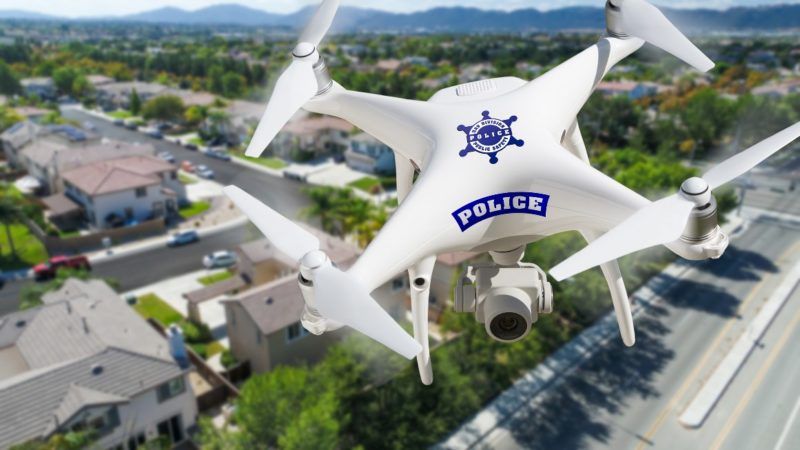Community Anger Shuts Down Connecticut City's Plan To Use Drones for Coronavirus Monitoring
Westport won’t be using tech to monitor people’s body temperatures or whether they’re properly social distancing.

It took all of two days for a Connecticut city's plan to use drone tech to snoop on citizen behavior to make sure they're complying with coronavirus rules for an angry public to shut it down.
On Tuesday, the Westport Police Department announced it had launched a pilot project in coordination with Canadian company Draganfly to send drones hovering around the city to make sure people in public spaces were maintaining six feet of social distance.
But these drones were much more intrusive than simply looking for crowds. Draganfly's drone-mounted biometric monitoring tools are even more sinister, dystopian, and potentially abusive. The drone is able to quickly measure whether people are six feet apart from each other, and Draganfly claims it can also measure heart rate, body temperature, and other vital signs, which suggests that a drone might be able to spot potential infections from above.
Here's how Westport Police Chief Foti Koskinas promoted this "Flatten the Curve Pilot Program" in a Facebook post from Tuesday:
"Westport and its first responder network is one of the most progressive public safety advocates in the nation. They are real pioneers when it comes to adopting and integrating new technology to protect its community. This pandemic has opened up a new frontier and urgent need for the use of drones. Draganfly is the first in the U.S. to implement this state-of-the-art technology to capture and analyze data in a way that has been peer reviewed and clinically researched to save lives."
The community was not thrilled. Facebook comments under the post blasted Westport for violating the privacy of citizens. The police department took a drone out for a test run intended to show the public that it was useful. Instead, it looked creepy. They brought the drone to a Trader Joe's where customers were waiting in line to be allowed into the store to go shopping. They were socially distancing, but they weren't always perfectly six feet apart, and the drone flagged people who were waiting just slightly too close to others or who passed by other people at a distance closer than six feet.
And that was pretty much all it showed—very brief moments of people being maybe a few inches too close to each other. This was not exactly pioneering new ways of keeping people safe. But it did have the potential to violate people's privacy since its biometric analysis supposedly detects symptoms associated with COVID-19, but also any other ailment that increases a person's temperature.
Connecticut activist Michael Picard—who's been written about previously at Reason—raised the alarm about these drones. "Technology is not the be-all and end-all," he tells Reason. "How can a drone sense when someone has a fever when the difference between a normal temperature and a fever is a tenth of a degree, and how will it know the difference between coronavirus and springtime allergies? This will just subject people to pointless harassment. This is just a stepping stone. Before you know it, police departments will be weaponizing drones."
On Thursday, Westport announced it would not participate in this pilot program after all. "In our good faith effort to get ahead of the virus and potential need to manage and safely monitor crowds and social distancing in this environment, our announcement was perhaps misinterpreted, not well-received, and posed many additional questions," First Selectman Jim Marpe said. "We heard and respect your concerns, and are therefore stepping back and re-considering the full impact of the technology and its use in law enforcement protocol."
In response to the city's decision, Picard declared "a victory for the people and civil liberties, especially in a time of overreach….Using drones to surveil people will only breed mistrust, and it will cause people to be unnecessarily harassed."
The entire proposal seemed like a policing tech project looking for an excuse to exist. Westport is a town of fewer than 30,000 people, and it's absurd to think that the police would need a drone to know when large groups of people are organizing, where they're organizing, and whether they're observing social distancing guidelines. Monitoring people's biometric information, meanwhile, is not just unnecessary but invasive and likely to result in police actions that cause more harm than good.


Show Comments (23)